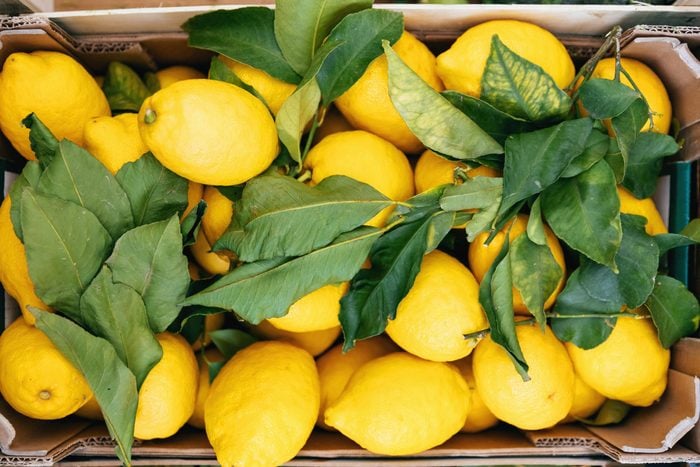
According to 2019 research in Advances in Nutrition, 12 different studies that took place in a variety of countries around the world made it clear that plant-based diets are a major factor “to achieve nutrition and environmental sustainability aims.”
To help outline what that means, registered dietitian Theresa Gentile, MS, RDN, CDN and National Spokesperson for the Academy of Nutrition and Dietetics, adds: “Environmentally sustainable food consumption includes plant-based foods, decreased meat consumption, seasonal and locally produced products and, sometimes, organically produced food.”
For a slightly more out-of-the-box take, we also spoke with Kim Matsoukas—the director of sustainability at COACH handbags, with more than 15 years in the consumer sustainability space and a master’s degree in environmental science & management. Matsoukas names the one place we can all start in trying to make the Earth itself healthier: “The easiest thing that people can do is reduce the amount of red meat they eat,” Matsoukas told us.
You’re hearing that right: Reducing meat consumption is great place to start—but even if you, or someone in your household, wouldn’t dream of cutting out meat entirely, there are other wise moves you can make to minimize your waste and carbon impact on the planet.
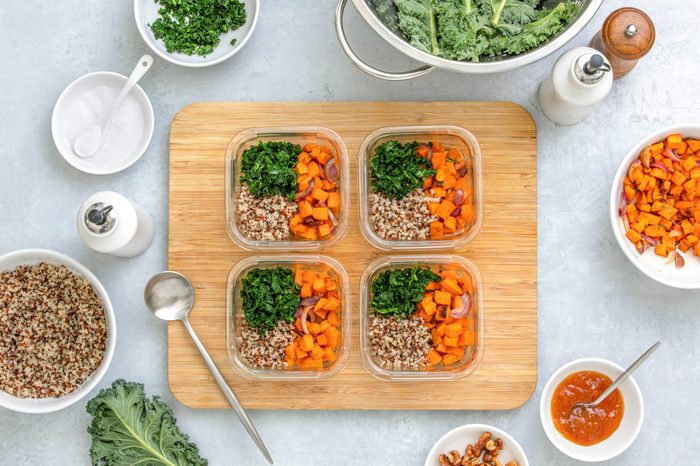
Plan meals & snacks ahead of time
Meal-planning is a great way to ensure that you’re buying just what you’re going to eat—and in turn cutting down on waste. Registered dietitian Yasi Ansari, MS, RDN, CSSD and national spokesperson for the Academy of Nutrition and Dietetics, suggests adding leftovers from meals and snacks in multiple recipes throughout the week. “I do this a lot with quinoa and potatoes! Potatoes and quinoa can be added to so many different meals,” Ansari says.
Gentile shared that when she’s meal-prepping at home, the most sustainable spread includes vegetables, fruits, whole grains, legumes, nuts and unsaturated oils, and a low to moderate amount of seafood and poultry. Gentile also avoids red and processed meat, added sugars or refined grains.
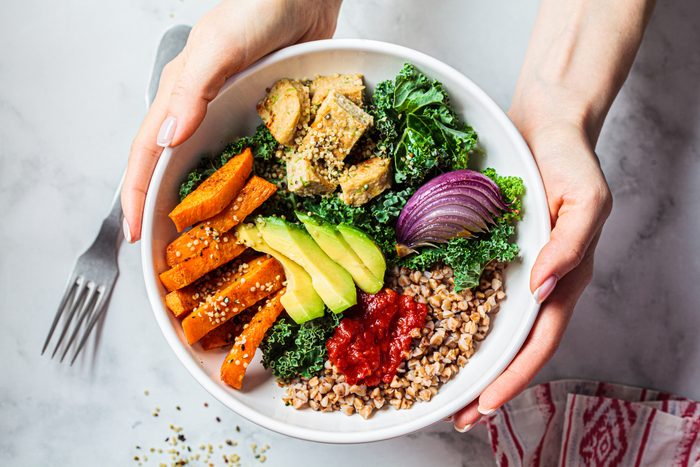
Have a meatless day
You may have heard of meatless Mondays, a practice where on this first day of the week, you pause from eating animal products and focus on more plant-based food. Ansari says you’ll soon likely find that a meatless day can be any day of the week and can help make your diet more sustainable.
Gentile says it’s just important to note a few things. “When eating more plant-based, it’s important to be aware that you might not be getting all of the key nutrients from food, so supplementation might be helpful,” she explains. “Strict vegans and vegetarians should just be aware to include B12, vitamin D, iron, iodine, calcium and omega-3 fatty acids.” She adds that these can come in the form of fortified grains, plant-based milks, fruits and vegetables and supplements.
The 4 Best Vitamin D Supplements Depending on Your Specific Needs, from Registered Dietitians

Reduce highly processed oils
When making changes to your diet for sustainability, we encourage you to read labels especially taking note of highly processed oils. This way, you can reduce the amount you’re consuming. Especially sneaky places these can appear are in many plant-based packaged foods like the “burgers” and “sausages” that you see in vegan sections at the store.
“It’s a good idea to try to limit plant-based foods made with highly processed oils,” Gentile says. “Some plant-based meat alternatives can have just as much saturated fat as red meat.”
The oils this dietitian recommends you should limit:
- Soybean oil (which is “highly refined,” Gentile says)
- Sunflower oil (“which contains a high amount of inflammatory omega-6 fatty acids.”)
- Palm oils (“which may not be ethically sourced and have a high amount of saturated fat.”)
- Trans fatty acids (which are some of the worst possible foods for your heart health, as well as manufactured—meaning, not natural).
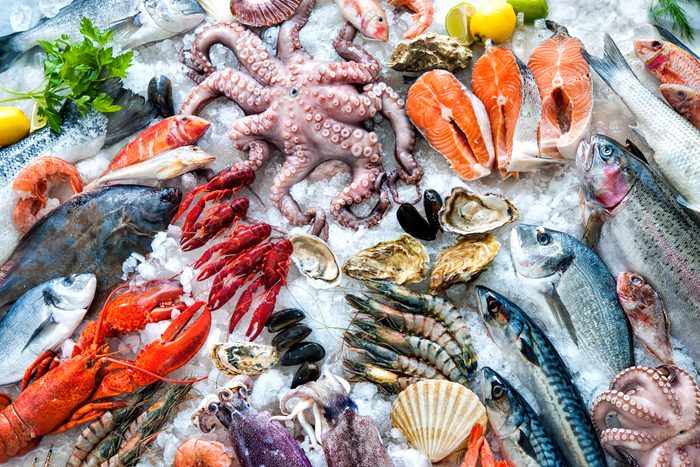
Look for sustainable seafood
When she’s eating seafood, Gentile suggests choosing sustainable. Here are some of her recommendations according to the Monterey Bay Aquarium’s Seafood Watch Guide:
- farmed Artic char
- catfish
- Pacific cod
- farmed scallops
- US-farmed shrimp
- US-farmed trout
- Albacore tuna
- Skipjack tuna
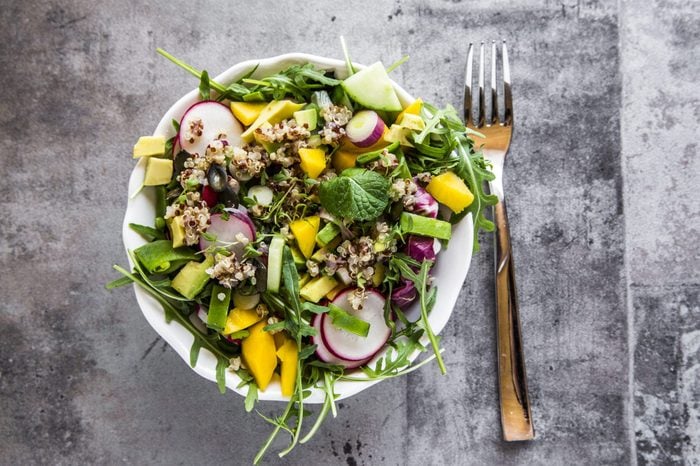
Eat more plant-based foods
It’s a good idea to stick to fresh fruits and vegetables, beans, nuts, seeds, and whole grains,” says Gentile. It’s also a great way to increase your fiber intake.
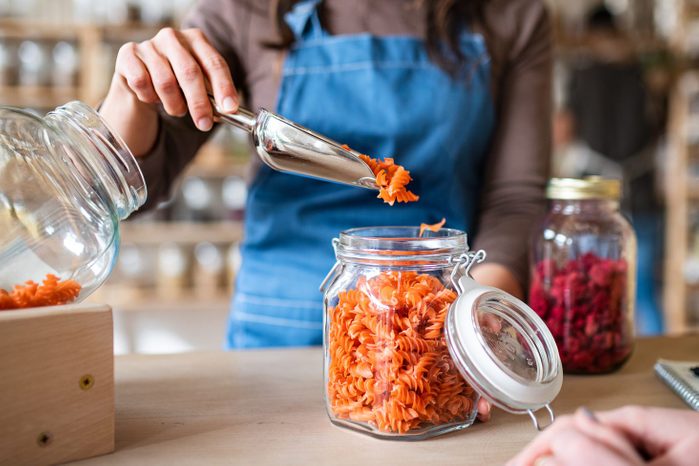
Buy foods in bulk
Gentile suggests buying foods in bulk (or family-sized) as a great way to make your diet more sustainable. “This can reduce the amount of plastic, paper, metal and energy that goes into manufacturing the packaging,” she says.
Ansari suggests buying herbs in bulk. Or, grow your own: 4 Easy Ways to Grow Indoor Herbs and Veggies
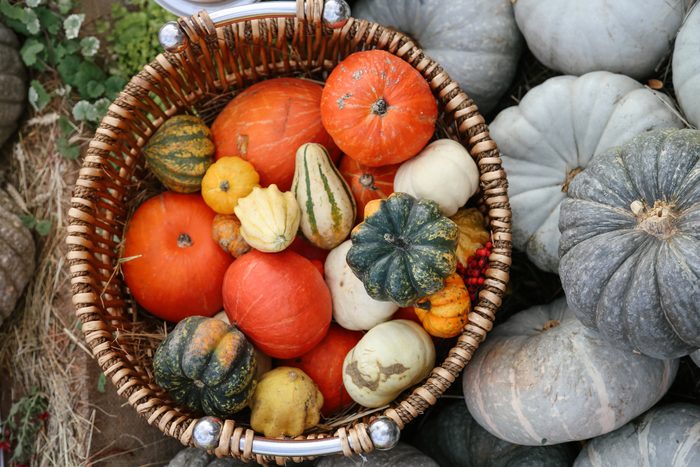
Eat in-season
“Eating locally seasonal can reduce the environmental impact of the diet and reduce greenhouse emissions,” Gentile says.
Ansari agrees: “Visiting the farmer’s market as a family every few weeks is a great way to add more in-season fruits and vegetables.” An added benefit of eating in-season is that the produce usually tastes fresher—and, at peak freshness, it delivers the most nutrients. So grab your tote bag and involve the family in produce-shopping in fresh air.
These Infographics Show the Fruits and Vegetables in Season Every Month of the Year
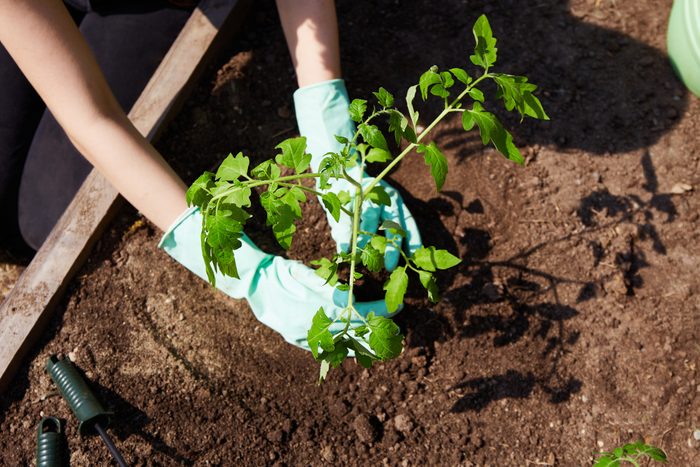
Grow a garden
Whether you have a yard or space in your home for some small plants, growing your own food can be a fun way to make your diet more sustainable. “If you are able to grow a garden, get the whole family involved in this activity. Growing plants can add nutrients to the soil, support more oxygen production and require less fuel that would have been used going out to the grocery store,” Ansari says.
Turns out, gardening is also the single most common activity among people who live to 100.
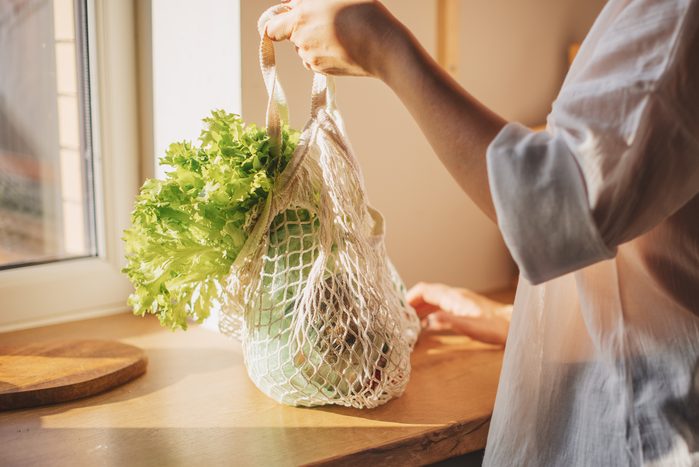
Don’t forget your reusable grocery bag
Many cities and towns have eliminated single-use plastic bags over the years in an effort to decrease waste. Gentile suggests bringing your own bag to the grocery store to cut down on petroleum-based bags in landfills.
Ansari also suggests using reusable jars in place of plastic containers and to look for foods with minimal packaging as well.
